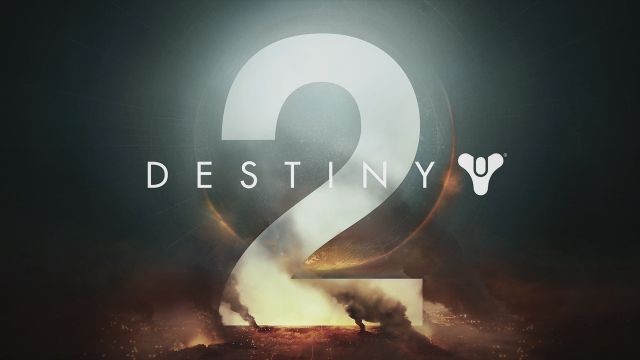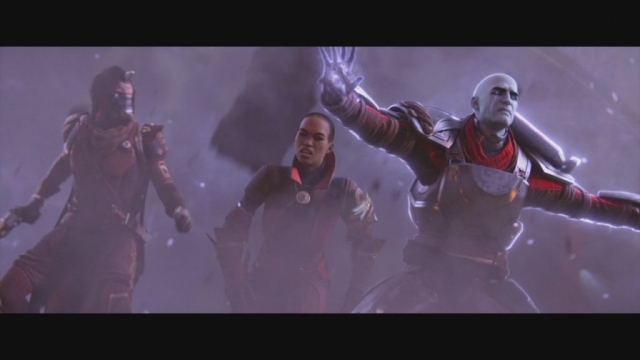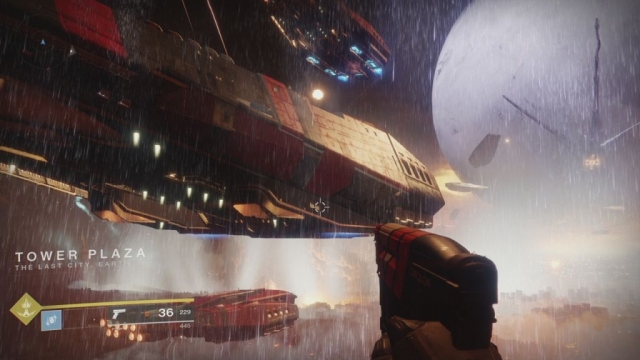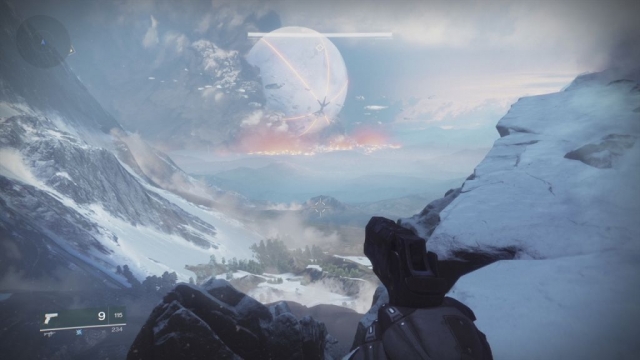Destiny 2

The original Destiny was met with some of the biggest hype in recent memory. As Bungie’s big post-Halo project, Activision sank tons of money into marketing it and used Bungie’s AAA shooter pedigree to great effect. They combined their experience with a new, larger-scale first-person experience than had been attempted on consoles. With an FPS as its basis, the game combined looting with a bit of exploration, massive boss battles, and team-based raids that required you to work together to succeed. The core action was fast-paced, and having a sidekick in the form of a “ghost” character was a great way to prevent the experience from seeming solitary when you just wanted to make progress by your lonesome.
It was a critical success, but one that was met with honest criticism. The game’s narrative was certainly lacking – with a large universe being hinted at and many characters being shown briefly, but without much in the way of in-game storytelling. This led to online resources being the best way to learn about the plot as the official site expanded upon the lore – which is fine for supplemental things in small doses, but a bit ridiculous when you would certainly like a narrative to be told. Sure, many FPS games tell sub-par stories – but Bungie was the exception to that rule with the Halo franchise, and this turn felt like a huge leap backwards for them.
Bungie clearly took this to heart and worked to remedy that issue as soon as possible – quite literally within the game itself. Destiny 2 starts off with more drama than Destiny had throughout much of its campaign, as your home base is under attack and you’ve got mass confusion. After the events of Rise of Iron, the Last City is attacked. The area that players grew to love and dance in, while also accepting missions in, is a flaming shell of its former self with casualties rising. Clusters of enemies swarm you and now it’s you against the horde in a battle for survival. It’s an exciting start and immediately gives you a chance to either learn the ropes if you’re new to the game or pick things back up quickly if you’ve been a lapsed fan of the original.
The sequel’s dramatic improvement when it comes to the story is incredible to see unfold in real-time. Whether you played the first game or not, you immediately know the hero and your villains, with some wrinkles thrown in for good measure. The emphasis on storyline here reminds me of what happened with Halo, but in reverse. With Halo, it started as having a single-player narrative with local multiplayer being strong and then things shifting to online multiplayer with a stronger story. With Destiny, it began with a strong multiplayer game that had a weak storyline wrapping the events together. Now, things have become far more balanced – with the increase in storyline focus making everything more enjoyable.
For the first time, the franchise feels like it’s becoming it’s own thing. The original felt like a Halo reskin to some, but that always felt like an unfair comparison. The game played differently enough even if it did use things that were popularized by the series, like regenerating health and a sci-fi setting. The world was much different, with a more galactic scope and a different cast of characters even if it did retain some things in a paint-by-numbers sense – like the in-game navigation and addition of an AI helper of sorts. Destiny 2 feels like the core adventure that I wanted to have with the first game. It’s exciting, scary, and foreboding all at the same time.
The early portions alone evoke more of the first Metroid to me, complete with a portion where you’re completely outgunned and have to use your smarts to survive. Avoiding damage becomes a key when you can’t respawn, so you have to duck and move and try to hide whenever possible. Doing so while having a ton of enemies surrounding you results in some of the most exciting action in the game and knowing that death means you need to replay a decent chunk of action encourages you to fight smart instead of rushing in guns-ablazing to try and secure a victory quickly. It isn’t quite the same as having a stealth-heavy approach, but it does make you put more forethought into your actions.
Destiny 2 features not only a great sense of isolation and fear, but also hope when you finally find allies on your quest. Triumphant music plays and finally gives Destiny a score on par with what was heard in the Halo series many years ago. The adventure takes you on an emotional journey and brings life to the universe that should have always been there while still keeping the more open nature of the franchise intact. Everything you enjoyed doing in the first game is here, but expanded upon while the gameplay feels tighter.
Melee attacks seem to have a bit more force to them, while vibration is used to convey things like fire around you and/or explosions going off. The immersion level is much higher now than it was in the first game, and a lot of that has to do with the world building that has been done via the campaign. Now, you really care about the characters and the settings. The areas aren’t just parts of the world you’re sent to – but living, breathing areas that need your help. The game finally feels like it has some stakes beyond just providing the thrill of victory and the agony of defeat. Playing online in large groups remains as fun as ever, and is actually a bit more fun thanks to the overall improvements in the presentation.
Visually, the sequel builds upon the gorgeous sights of the original with more reliance on real-time lighting and less on the matte painting-style backdrops. Character models have been beefed up, and the environmental textures look better than ever. The overall scale of everything is much larger and with that comes more resources being used. Despite that, the game’s frame rate is nice and smooth without any stutters, even in larger-scale battles, which is pretty impressive. Destiny 2 isn’t a world-changing improvement over the original, but it does improve upon what was there before and doesn’t do anything worse.
Musically, the soundtrack features some of the best songs in Bungie’s catalog. While the Halo franchise had some epic songs, there is a level of depth and beauty of the slower-paced songs in Destiny 2 that has rarely been matched in a shooter. Some of the music would be right at home in more realistic games like Shenmue, where that kind of orchestral soundtrack usually shines. Instead, we get giant firefights and battles with epic songs that bring things up to an almost God of War-level of intensity when it comes to the music. The voice acting is far more prevalent, and improved compared to the first game. Much like Titanfall 2, adding an overall story to the game’s events helps things tremendously and the entire cast does a fine job with the roles they were given.
Destiny 2 is a near-perfect sequel and fixes the few things that were problematic with the original. It is one of Bungie’s finest games yet and a fantastic FPS that offers a nice learning curve that makes it more accessible than most shooters on the market. The story has a surprisingly high amount of depth to it and adds life to the in-game world in a way that the original simply couldn’t. Anyone who enjoyed the first game should pick this up, and those who missed out can safely jump in thanks to the story structure recapping the broad strokes of what happened before and letting you know things fairly quickly. It’s a gorgeous game that sounds epic and controls like a dream too.
Reviewed By: Jeremy Peeples
Publisher: Activision
Rating: 98%
——————————————————————————–
This review is based on a digital copy of Destiny 2 for the PlayStation 4 provided by Activision.
 Game Over Online
Game Over Online














98% what a bad Fanboy-review.